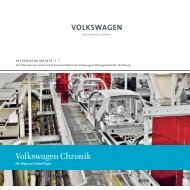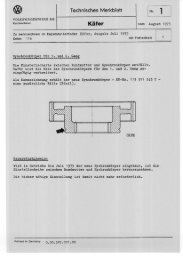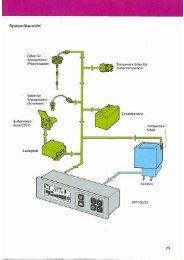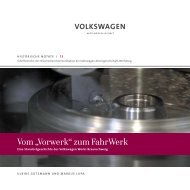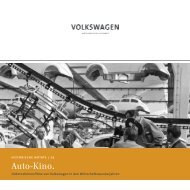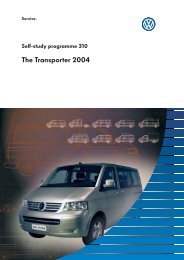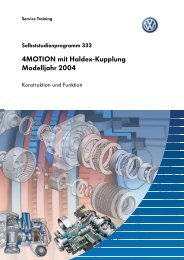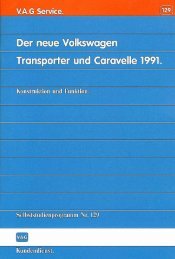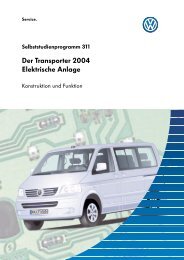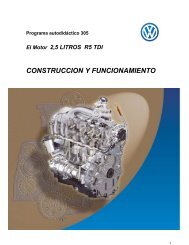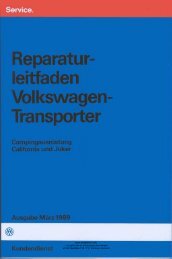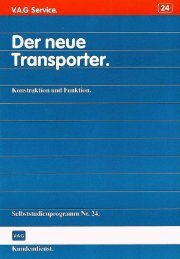HN 2: The British and their Works
HN 2: The British and their Works
HN 2: The British and their Works
Create successful ePaper yourself
Turn your PDF publications into a flip-book with our unique Google optimized e-Paper software.
General manager Münch approached the supply headquarters<br />
of the German mining industry concerning the supply problems.<br />
Its representatives declared <strong>their</strong> willingness to supply<br />
the Volkswagenwerk with the required sheet metal, while reserving<br />
proprietary rights. In return the company undertook to<br />
deliver an appropriate quantity of vehicles. 82 <strong>The</strong> mining industry<br />
order was followed by a new order from the "L<strong>and</strong>eswirtschaftsamt"<br />
(State Economic Office) of Lower Saxony in mid-<br />
June 1947 for 1,580 cars. This secured for the Volkswagenwerk a<br />
firm production of 2,180 cars over <strong>and</strong> above the comm<strong>and</strong>ed<br />
production, but far exceeded its capabilities. During the discussion,<br />
Wenk requested binding information on monthly<br />
production to year end, unsurprisingly since he had had to scrap<br />
his original planning <strong>and</strong> at the end of May 1947 had to decrease<br />
the called-in production surplus for the current year from 4,000<br />
to 2,300 vehicles. Meanwhile, general manager Münch did not<br />
feel able to give reliable figures for the course of production,<br />
referring to among other things the acute labour shortage<br />
which had occurred as a result of the sudden withdrawal of 300<br />
Lithuanian workers. In view of the situation as presented, Wenk<br />
regarded further orders to the Volkswagenwerk as being "no<br />
longer justifiable" <strong>and</strong> threatened to channel all further fleet<br />
allocations to the Daimler-Benz <strong>and</strong> Opel corporations. 83<br />
Startled by this warning, Münch held out the prospect of a small<br />
number of Volkswagens for export.<br />
In mid-1947 the Volkswagenwerk could not complain about a<br />
lack of orders. Regrettably, the boom in dem<strong>and</strong> coincided with<br />
a worsening of the material supply situation. Reduced raw<br />
materials allocations <strong>and</strong> power cuts averaging 40 per cent at<br />
the rolling mills also made themselves felt at the supplier firms<br />
<strong>and</strong> had a serious effect on material supplies. <strong>The</strong> situation for<br />
the purchasers at the Volkswagenwerk was made more acute by<br />
the suppliers’ refusal to deliver <strong>their</strong> products without recompense.<br />
Because the company had not kept its promises, they<br />
operated a form of "passive resistance". Some sent almost daily<br />
reminders to supply the vehicles promised them. <strong>The</strong> closer currency<br />
reform loomed, the more closely the overvalued<br />
Reichsmark resembled worthless paper. <strong>The</strong> barter economy<br />
became widespread, <strong>and</strong> many materials in short supply could<br />
only be had via swap deals.<br />
By a tacit underst<strong>and</strong>ing with the "Hauptverwaltung Straßen<br />
und Verkehr" in Bielefeld, motor manufacturers such as<br />
Daimler-Benz, Opel, Ford <strong>and</strong> Büssing could normally earmark<br />
five per cent of <strong>their</strong> production for <strong>their</strong> suppliers. This was a<br />
more telling argument than the "m<strong>and</strong>atory priority" of the<br />
Volkswagenwerk, which made less <strong>and</strong> less of an impression on<br />
the suppliers. And the Economic Administrative Office announced<br />
that it could not allocate raw materials because there were<br />
no more available. For the rest, the priority neither applied to<br />
the manufacturing industry, nor was it sufficient to support<br />
injunctions on the steel industry. For textile allocations, for<br />
example, the degree of urgency was only acknowledged if the<br />
military government paid the full value of the raw materials<br />
in dollars. This however it refused to do since not all the cars it<br />
needed had been produced. 84<br />
36 37<br />
SHORTAGES OF RESOURCES



